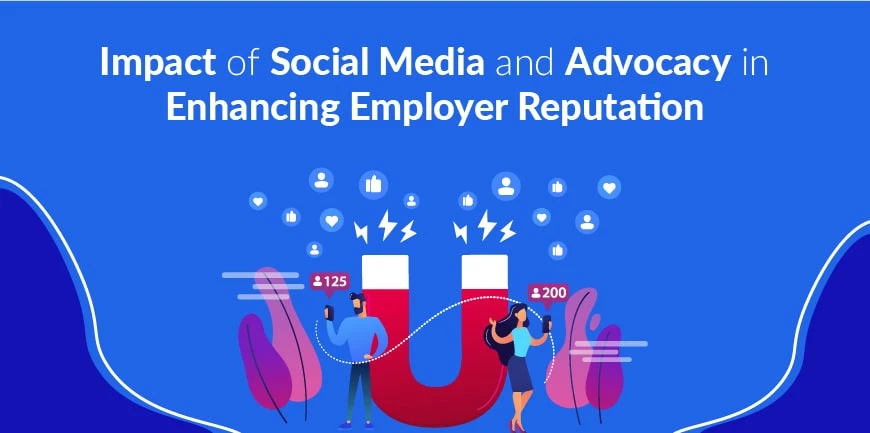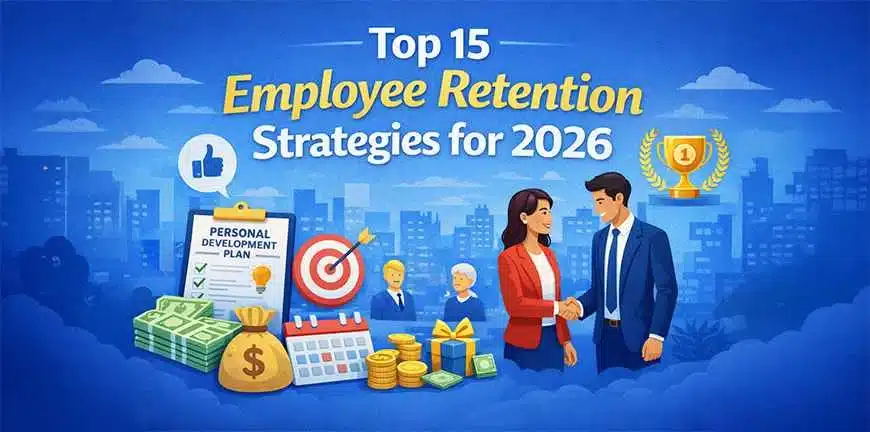
What is Flexible Talent? Benefits, Types, Challenges, Trends
30/04/2025
How to Get a Job in Japan from India?
01/05/2025“Great people. Great culture. Greater impact.” “Built on trust, driven by talent,” are the kind of slogans companies create and build strategies to amplify their brand image. However, in today’s digital and hyper connected age, a company’s image as an employer is not created behind closed doors anymore and does not depend on solely traditional metrics like salaries and office benefits.
Then what truly sets companies apart? It is the stories shared online by employees, leaders and the brand itself that does the magic. Social media and employee advocacy are the ground breakers, transforming everyday moments into impactful brand statements shaping how the world perceives your workplace.
The Digital Shift
Today potential candidates are highly influenced by platforms like LinkedIn, Instagram, Glassdoor, and even TikTok and they perceive organizations on how the company is displayed on theses platforms. Employer branding is now a dynamic, public, dynamic, and a continuous narrative.
Earlier brand perception was controlled exclusively by the HR or marketing department but gone are the days. Today, every post, comment and employee testimonial contribute to the making or breaking of an employer brand.
Social Media: A Brand Amplifier
Social media is a game changer in today’s age enabling organizations to share their values, culture, and achievements in real time. Who would have thought that one can present their vision and mission to the world in real time through carefully curated content.
The content can be as creative as it gets like showcasing employee spotlights, celebrating diversity, or sharing behind-the-scenes candid moments. Organizations can connect with audiences on a personal level by humanizing their brand.
Potential candidates get drawn when they see authentic interactions on a firm’s social media platform giving them a fillip to build trust. It is about creating a sense of purpose and belonging and not just about promoting job openings anymore.
63.9% of the global population actively use social media daily, 48% of candidate’s research company culture on social media before applying.
Employee Advocacy: Voice That Matters
Branded content is significant but the voices that has great power and impact are those of the employees. The trust factor works the most especially when it comes to choosing a workplace.
Numerous studies show that content shared by employees receives a significant volume of engagement than content shared by companies. Employees sharing their experiences, achievements and work culture moments automatically transforms them into brand ambassadors.
This approach adds authenticity and uplifts reach. Initiatives supporting employee-generated content like branded hashtags or internal social media challenges might prove to be extremely effective in this context.
Why Employee Advocacy Matters in Talent Acquisition
1. Enhanced Employer Branding
Employees speaking positively about their workplace brings forth an effective layer of credibility and authenticity to the employer brand that cannot be replicated by any amount of corporate messaging can. The reason is simple. Authentic voices matter. Curated marketing campaigns or diligently crafted employer value propositions play a vital role but cannot beat employee testimonials, lived experiences that reflect the genuineness.
Employees highlighting a behind-the-scenes look at the culture, leadership, growth opportunities and work-life balance receive a better response. The stories are heard from individuals who experience the work environment daily.
2. Increased Reach and Visibility
Employees are also micro-influencer within their own professional network. It could be LinkedIn, Twitter, or any other communities or even personal conversations, every employee can intensify a company’s voice in an organic, trusted, and far-reaching way.
An organizations company’s official job post or brand announcement might attract a few thousand followers, but you know what will happen if a single employee shares that same message? It can open the door for entirely new audiences, ones that have no direct contact with the brand.
It will be noticed that suddenly that your employer brand and open roles are surfacing on the feeds of tens of thousands of professionals all based on personal credibility.
3. High Quality Applicants
Candidates getting recruited through employee referrals or discovering opportunities via employee advocacy are often a better fit from the beginning in terms of skills and in terms of aligning with the company’s culture and values. Employees working in a particular work environment will refer or share opportunities with individuals they know, trust, and are certain would flourish in the company’s environment.
They are aware of the company’s culture, leadership style, team dynamics and day-to-day affairs making it more likely that they recommend people who would be a natural fit. Studies show retention rates are higher with that referred employees and organizations with robust referral programs often witness significantly better ROI on their recruitment efforts.
4. Cost-Effective Hiring
Employee advocacy is not just about boosting a company’s visibility and engagement it also offers substantial savings and efficiency to your recruitment initiatives. Traditional recruitment channels like job boards, head-hunters, paid campaigns can be a costly affair and can prove to be inefficient.
Meanwhile, employee advocacy, leverages an asset that is your people which is already available. Employees sharing open roles with their networks automatically diminishes the reliance on expensive third-party services enabling to lower cost-per-hire significantly. Job seekers joining companies through employee referrals or advocacy are usually pre-qualified, highly engaged and more receptive.
They can move forward faster as they align well and often come with a recommendation. This culminates in a shorter time-to-fill not only saving money but saves not only money but valuable team time and productivity.
5. Improved Employee Engagement
Employee advocacy and employees acting like brand ambassadors has a powerful effect on not just promoting the company externally but also has a profound internal impact.
Team members empowered and encouraged to share their workplace experiences, achievements and company values lead to fostering their own engagement and connection to the organization.
An employee publicly sharing something positive about their workplace, it could be a new project, a job opening or a behind-the-scenes moment subtly indicates pride and ownership. This kind of proactive sharing is a sign of reinforcing a sense of belonging and that they genuinely care about the brand and are excited to be part of it.
The inclusion intensifies their emotional connect to the company making it more likely for them to stay, contribute, and grow.
Implementing Employee Advocacy: Best Practices
1. Nurture a Positive Workplace Culture
Advocacy begins when employees are happy. Companies should ensure fostering a supportive and inclusive environment enabling individuals to speak positively about their employer and the brand.
2. Provide Content
Building a successful employee advocacy program requires making it seamless and effortless for employees to participate. A company providing pre-written templates or captions and visuals can enable employees to personalize them or use them as-is with confidence.
3. Offer Training and Guidelines
To promote your brand, you can offer training sessions and guidelines to your employees on how to highlight the company online. Simple dos and don’ts and train them with some key features you want to promote that they can present.
4. Recognize and Reward
Recognition can be one of the most impactful drivers of engagement. Employees feel appreciated and respected when their advocacy efforts are noticed. You as a company can organize recognition programs or small incentives to encourage others to participate.
5. Use Technology Correctly
To strategically scale employee advocacy, the usage of dedicated advocacy platforms is important as they simplify content sharing, boost participation, and optimise results with the help of powerful data. Suitable advocacy platforms streamline content sharing and track impact.
A Culture Worth Sharing
Social media and advocacy can only gain traction if the foundation is strong. Organizations need to pursue a culture where employees feel heard, respected, and motivated.
Any social media strategy will fall short if a work environment is disengaged and unpleasant. Genuine experience can only generate advocacy, and leadership plays a a\ pivotal role. Company leaders should facilitate transparent communication, recognition, and empowerment to craft a culture people will be proud to share publicly.
Candidates are prioritizing: Mental health initiatives (21%) Fair treatment and inclusion (45%) flexible work schedules (30%).
1. Metrics That Matter
A robust employer brand is characterized by increased application rates, accelerated employee retention, higher engagement scores and positive Glassdoor reviews. These are where the real value lies along with than likes and shares.
To get the taste of a long-term impact, regular tracking of these key metrics becomes significant. These metrics can help hone strategies and comprehend which platforms and narratives are reverberating with the audience most.
Employee advocacy was once primarily a brand-building marketing tool, a method to generate buzz. But in today’s digital era and trust-first world, it has become a cornerstone to attracting top talent.
The reason is loud and clear. Job seekers today are not just evaluating companies based on job descriptions anymore but are also looking at look at the individuals working in the company. They weigh factors like what is the culture, are the employees happy, can they see themselves working in such a work environment and many more.
Employees talking about their wins or sharing the reasons why they love their place of work creating wave of credibility. The authentic gestures enable building trust even before the first interview ever happens.
Every employee is well equipped with their own network entailing potential hires, passive talent, and referrals that is not reachable through a job board or paid ad. Authenticity and relationships matter the most in the world we live in today and employee advocacy is a framework for attracting, engaging, and retaining extraordinary talent.
Companies powering their people as brand ambassadors are not just hiring but are building and nurturing communities that organically and effectively draw in the right people.
Contact Us For Business Enquiry

Rajkumar Shanmugam
Rajkumar Shanmugam is the Head of HR at ALP Consulting, bringing over 19 years of comprehensive HR leadership experience across India and international markets. His expertise spans talent acquisition, employee relations, performance management, compliance, and HR transformation. Rajkumar has a proven track record of driving people-centric initiatives, enhancing workplace culture, and aligning HR strategy with business goals. With extensive experience in US staffing operations and global mobility, he continues to lead organizational excellence through innovation and employee engagement.




